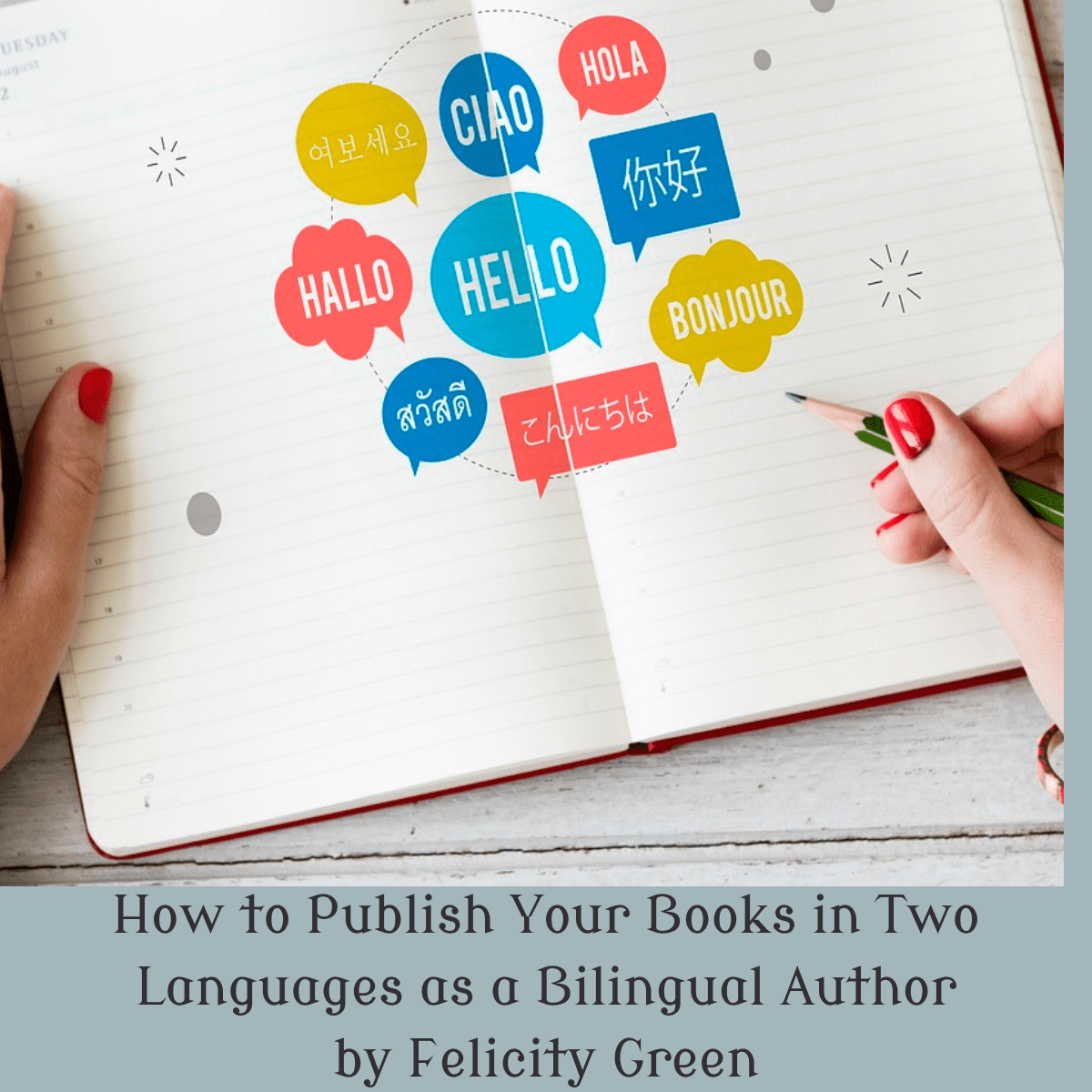When I first started self-publishing in 2014, I was familiar with the German book market. I had worked at small publishing companies in Zurich, as an editor and in marketing, so I knew how to write, distribute, and market a book.
It made sense to write my first books in German, but I always planned to translate them. I definitely wanted to publish books in English. I’d studied Creative Writing at the University of Sussex, UK, and my first published short fiction had been in English. On top of that, I had experience as a literary translator. I’d worked for AmazonCrossing and translated works by indie authors from English to German and vice versa.
It seemed as if I had all the prerequisites to write my books in two languages and conquer both the German- and the English-speaking markets.
It is now ten years later, and I only now published my most successful series, the Scottish Witches paranormal cozy mysteries, in English. I am happy to report it is going well, but it was not easy—and I am many years behind in my original plan.
What happened?
I never seemed to “find” the time. My German books did well, and my readers wanted more of them. I was only too happy to oblige. It seemed much more creatively fulfilling and exciting to write new books instead of translating old ones.
And I tried and failed with the wrong series in 2016. It was the wrong genre. The books were a new novella series that later also turned out to be my worst selling German book series. I had poor covers, did not know how to get reviews, and, worst of all, I had no clue how to connect with my English readers. It took me a while to dust myself off and try again.
The good news is that I had plenty of opportunities to learn from my failures.
Here are a few tips for my fellow bilingual authors:
- Budget time and energy well
You only have a finite amount of time and energy to give to this career. Saving money by doing your own translations (and everything else like formatting, distribution, and marketing) seems like a no-brainer at first, but that means you need to budget your time and energy differently. A translation takes a couple of months—months in which you could have written a new book. If you do most of the work yourself, you can publish fewer original works, even though you have more products to sell. Selling and marketing to readers in different countries takes double the time as well.
You need to weigh up what is most important to you.
Your primary resources to consider are money, time, energy, and control.
For example, it is risky to spend a couple of thousand dollars on a translation, since you might never recoup that money. But if doing the translation yourself robs you of your creative energy, it might not be worth it, either. I get a productivity kick out of translating a chapter a day, so it gives me energy. I don’t have a lot of time left to devote to writing, however, so that’s also something to bear in mind.
I don’t mind letting someone else handle marketing, but only for specific tasks, because I still want to maintain control over where my budget goes. Also, I like to be in close contact with my readers.
- Get help
Once you have weighed up what financial investments, time, energy, and control are worth to you, you can decide about outsourcing.
If you want to write at least two or three books a year, and also translate and publish them in different languages, you simply can’t do everything by yourself.
Getting help doesn’t always need to be expensive, by the way. You can build up your newsletter list with newsletter swaps, for example, and then ask fans on your list if they want to join your ARC team. A lot of advanced readers leave not only a review upon publication, they also happily let you know typos, so you don’t need to pay an expensive proofreader (if you are okay with letting a few mistakes slip through the cracks).
- Hire a good editor
This is one area where it does not pay off to be stingy, in my opinion.
First of all, just because you speak the language, doesn’t mean you are a good translator. There is an art to an excellent translation. AI tools have improved vastly in the last few years, but there is no replacing a human being with expertise. By all means, use AI, like DeepL, to help with the translation. I use it myself for the first draft, as I prefer it to a blank page. It still takes me two months to rewrite the AI draft. And I gladly pay my editor and proofreader to whip that draft into final shape. Also consider who—and where—your target readers are. My ideal reader is from the US, someone who dreams of traveling to Scotland. I speak UK English, so I hired an editor from the US.
- Connect with readers
One of my biggest mistakes when I failed in 2016 was not to connect with my English readers. You cannot just publish a book into the void. That doesn’t mean you have to write to market, but once your book is done, you absolutely have to consider who your readers are and how you can reach them.
In 2016, there was literally a big ocean between me and the readers I wanted to connect with. I did not know how to cross it. This time, I spent a bit of time building up my English newsletter before I published the first book in the series. I set a budget aside for ads as well as inexpensive services to do newsletter swaps and joined promotions of the free book I send to every new newsletter subscriber, NO REST FOR THE WICKED WITCH.
It was worth it. I get quite personal in my welcome email sequence and talk about the trip to Scotland that inspired the Scottish Witches Mystery series. I love getting emails from my readers in response, so I can get to know them better.
Other authors might be better suited to connecting with readers on social media, for instance, in FB groups.
There are also inexpensive services that match authors with reviewers, like Booksirens and Booksprout. I found them very useful. I connected with reviewers who are now fans of the series.
- Remember, you are in charge
If all this sounds A LOT—it is. But always remember that you are in charge. This is your career, and you should enjoy it! Do you have to translate your books and publish them in different languages, just because you are bilingual? No. You can still hire a translator, sell the rights to foreign publishers, or stick with books in one language.
We indie authors have so many opportunities and are always susceptible to FOMO. In truth, we are bound to miss out on chances to grow our careers all the time. We can only listen to our hearts and guts to know what to focus on. So you do what suits you best.
And don’t forget to have fun with it. I had to get over a lot of pressure and anxiety to try again with my English books.
As writers, we have the privilege of making a living with what we love. And even if we do not make a living with it, we chose to spend our time doing it, because we are so passionate about it. So we might as well enjoy it and do what feels good!

 Felicity Green is the best-selling fantasy and paranormal mystery author of the Scottish Witches Mysteries and over 30 other books, in English and German.
Felicity Green is the best-selling fantasy and paranormal mystery author of the Scottish Witches Mysteries and over 30 other books, in English and German.
A German native, Felicity spent over a decade in England, studying English literature and drama and pursuing her dream of becoming an actress. She toured the British Isles with theater groups and fell in love with all those magical places in England, Scotland, and Ireland that continue to inspire her novels. Once Felicity started writing her own plays, she knew she had found her calling. She holds an MA in Creative Writing from University of Sussex.
When Felicity isn’t writing or reading, she enjoys traveling, yoga, hiking, and trying out new recipes. Felicity lives at the German-Swiss border with her husband, her daughters, and an idiosyncratic Maine Coon cat.
www.felicitygreenauthor.com
How to Publish Your Books in Two Languages as a Bilingual Author by @AntjeFelicity: Share on X
Image by Trid India from Pixabay



As I only speak and write one language (and my Japanese is rusty beyond repair) I would definitely need a translator. My publisher did sell foreign rights to my series, so it's available in Turkish!
Having your series in Turkish is so cool!
Such good advice here, Felicity! Hiring a good editor probably pays for itself in the long run. Thanks so much for guest posting today!
Thanks for this really helpful advice! I've thought a few times of getting my work published in Spanish, since that's my other language. You've given me a lot to think about!
I didn’t realize you were bilingual, Margot! That’s great. :)
I'm like Alex and would need a translator. Thanks for the helpful tips.
Babelcube is the big name in indy translator, but there are other players!
Learning to budget my time is a skill I have yet to master.
I think it’s a work in progress for everybody!